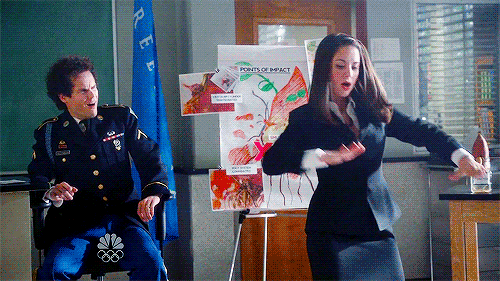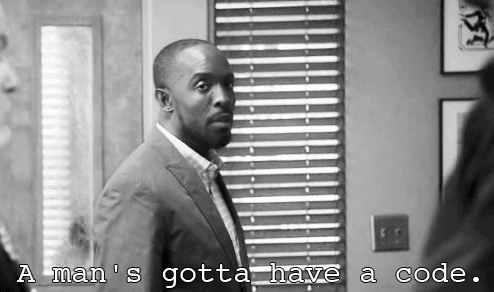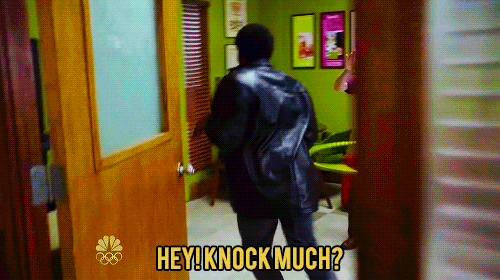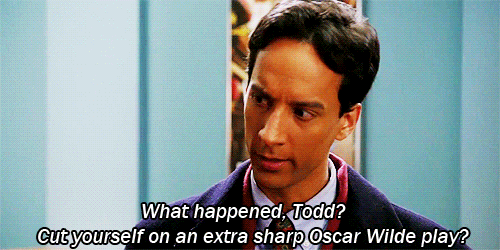- 888
- 34
she's so damn cuteOriginally Posted by Big J 33


and this episode was great, by far the best of the season
Follow along with the video below to see how to install our site as a web app on your home screen.
Note: This feature may not be available in some browsers.
she's so damn cuteOriginally Posted by Big J 33



Originally Posted by theDEEK
They really gonna kill star burns though? I wonder what next weeks episode will be like.
I wonder what next weeks episode will be like.
"Look at this, Abed. He weaves baskets and cut his hand."
He said "he weaves baskets and lies"
I love how they would get real serious and it seems just like L&O
then they'd reel it in quickly with an absurdity. When they were at Britta's computer, Hot dog stand, interrogation scene, courtroom scene.
Co-sign on everything Annie. Can't say enough how sexy she is. She makes everything sexy. That youtube video.
























 I'll update it when I get a chance; just can't login to do so right now.
I'll update it when I get a chance; just can't login to do so right now.
 annie
annieBig J 33 wrote:
Can 'Community' work without Dan Harmon?
Television shows have many minds contributing to them, but the best shows tend to speak with one voice. It's usually the voice of whoever created the show, and almost always the voice of whoever is running it. And when that person leaves — especially if that person has a voice that doesn't sound like the one you hear on any other show — it can be a huge challenge for the series to overcome.
It's a challenge that "Community" is going to have to deal with now that we know creator Dan Harmon won't be continuing as showrunner.
Harmon's contract was up after this most recent season, and Sony, which produces "Community," decided it would rather push forward without him. (AsHarmon noted on his blog, no one even contacted him between the season 4 pick-up and when he heard that he was being replaced.) As reported by Joe Adalian at Vulture, the studio took issue with both the esoteric creative direction Harmon took the show in and with his at times very abrasive management style. The most public example of that was his feud with Chevy Chase, but that's just one drop in the bucket; as one of Adalian's sources put it, "Dan is a brilliant at ideas, but he's terrible at [management]."
And there's not even a chance for an orderly transition. Harmon's chief lieutenants, Neil Goldman and Garrett Donovan, had already left a few weeks earlier to develop their own shows and run FOX's new "Ben and Kate." The writing staff has seen a number of other key defections over the years, and the highest-ranking writer left, Chris McKenna, apparently didn't want to take over a "Community" that didn't involve Harmon. (He tweeted late last night that he was leaving the show.) So the new showrunners will be "Community" newcomers: Moses Port and David Guarascio, who have worked on a number of Sony shows over the years (as mid-series showrunners on "Just Shoot Me," as creators of "Aliens in America" and producers on "Happy Endings").
It's entirely possible that "Community" will still be a funny show without Harmon. The cast is talented enough, and the characters delineated enough, that you can imagine a much more straightforward version of the show in which an unlikely group of friends have wacky adventures on a college campus. Given how strange — and expensive — Harmon's deviations from that formula tended to be, it wouldn't be surprising if that's a version of the show that both NBC and Sony would prefer.
But it's hard to imagine a post-Harmon version of the show being as unpredictable, as daring, as moving and, yes, as gut-bustingly funny as it was under his watch.
Other series have tried to replace idiosyncratic, unmistakeable voices late in the run, and usually not well.
The most infamous example of this was "The West Wing," where creator Aaron Sorkin frequently came into conflict with the studio and fellow producer John Wells for many of the same reasons that influenced the Harmon/Sony talks: cost and schedule overruns, personality clashes, etc. Sorkin, knowing he was being pushed out the door at the end of the fourth season, decided to stick it to Wells by writing a cliffhanger that essentially blew up the show, with Zoey Bartlet being kidnapped, President Bartlet temporarily stepping down, and the blowhard Republican Speaker of the House taking over the Oval Office.
It took Wells, now writing the series for the first time (he had left the day-to-day to Sorkin and directing producer Tommy Schlamme), several episodes to undo the mess Sorkin left him. But if he could restore the characters to their original positions, he could never quite make them act — and, in particular, speak — the way they had under Sorkin, and the series went into a very dark period where it seemed an angry, pessimistic imitation of what it used to be. Wells was able to pull out of the tailspin in the last couple of seasons, but mainly by starting an unofficial spin-off that focused on the race to elect Bartlet's successor. He never mastered the Sorkin version of the show; he just eventually figured out a new version that he could make work.
Part of the problem with replacing Sorkin, of course, is that he wrote or co-wrote virtually every episode for four seasons. The quality varied from week to week (particularly in his last two years on the show), but the voice was always unmistakably his.
David Milch's name wasn't on every "NYPD Blue" script during his seven years running that show, but that was only because he liked to credit the writer who did the first draft. Milch would then meticulously rewrite each script until it became uniquely his own, with the same odd cadences and verbal curlicues that would be just as apparent in his HBO series "Deadwood," "John From Cincinnati" and "Luck." As with Sorkin, Milch's writing workload sometimes made the final product suffer, leading to storylines that went nowhere, most notably the way the secret origin of Rick Schroder's tortured Danny Sorenson remained a secret from viewers. When Milch left "NYPD" to develop his own series away from longtime collaborator Steven Bochco, the show became more consistent and easier to follow, but it also lost the spark of mad genius it had under Milch. The Bochco-led seasons had their moments, but they never really achieved the poetry the show had at its best in the earlier years.
Amy Sherman-Palladino created "Gilmore Girls," and it was clear from every script she wrote and every interview she gave that Lorelai Gilmore was an extension of Sherman-Palladino, only taller and with fewer gaudy hats. Like Sorkin, Sherman-Palladino wrote distinctive, rapid-fire dialogue that sounded very specific to her and to that show, and when she and her husband and producing partner Daniel Palladino couldn't agree to a contract for the final season, her replacement David Rosenthal could never make it sound quite the same. Rosenthal was able to put together a satisfying enough final episode, which included Rory meeting her longtime idol Christiane Amanpour, but it wasn't the finale that Sherman-Palladino would have done. (And not just because she had talked for years about the mysterious two-word sentence that she always knew would be the last line of the series.)
There have been other instances of famous and/or unmistakable creative forces leaving shows, but never quite that jarringly. Larry David wasn't there for the last two seasons of "Seinfeld" (save the finale everyone hated), but with Jerry Seinfeld still present, the show felt mostly like what it had been in previous years. Joss Whedon dialed back his involvement in the last couple of years of "Buffy the Vampire Slayer" while he had other projects in the works. Some fans object to one season or the other (if not both), but Whedon was still present enough to influence things (and to write the occasional genius episode like the season 6 musical episode). David E. Kelley — who, like Sorkin, tends to write every episode if he can — eventually dialed back his involvement on many of his series, but with the exception of "Chicago Hope" (where he stepped down after the first season and the show transformed into a more traditional, less quirky medical drama), it usually came late enough in the run that the shows had enough other problems to worry about that his absence was less noteworthy.
With Harmon and "Community," it's less about the cadence of the dialogue than it is about the style and ambition of the series. "Community" is the only sitcom I'm aware of where every episode's story was modeled on Joseph Campbell's "The Hero's Journey," and the show under Harmon was capable of morphing into a spaghetti Western, a zombie movie, a stop-motion animated Christmas special or whatever other genre Harmon felt like tackling that week. The homages and other high-concept episodes were always lovingly rendered, and the best of them also managed to combine with parody with genuine stories about the show's characters and the problems they were dealing with. The show isn't exactly auto-biographical, but its sensibilities are very much filtered through all the pop culture Harmon has consumed in his life, and Harmon has said that researching Asperger's syndrome to help him better understand Abed made him realize that he had Asperger's as well. "Community" is Dan Harmon; Dan Harmon is "Community."
The three episodes that closed out Harmon's tenure summed up its scope nicely: in the first, the study group entered a retro 8-bit video game to help Pierce protect the inheritance left to him by his insane, racist father; in the second, the group staged an "Ocean's Eleven"-style heist to free the school's kidnapped dean; the third was slightly more down-to-earth, yet still managed to feature Abed being replaced by an evil doppleganger from another timeline while Troy participated in an obscure rite of combat to solve a murder at Greendale's air-conditioning repair school.
"Community" under Port and Guarascio may turn out to be a proficient sitcom (and could, in Sony's wildest dreams, run for several more years the way that "West Wing" and "NYPD Blue" did without their original voices), but it won't be... that. And while Harmon's creative lunacy didn't help "Community" find a larger audience, it made the handful of people who do watch mad with devotion for a version of the show that may have just ceased to exist.
http://www.hitfix.com/blogs/whats-alan-watching/posts/can-community-work-without-dan-harmon